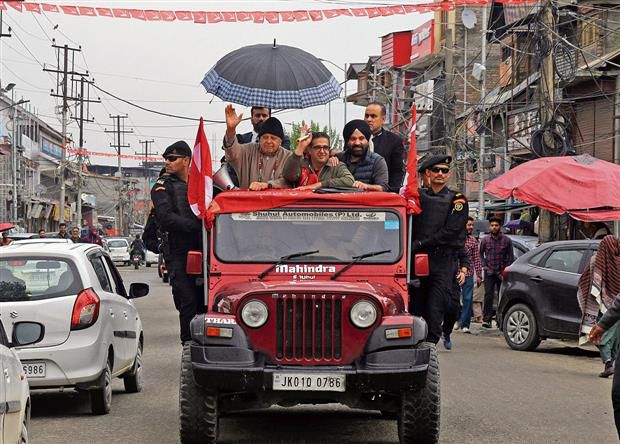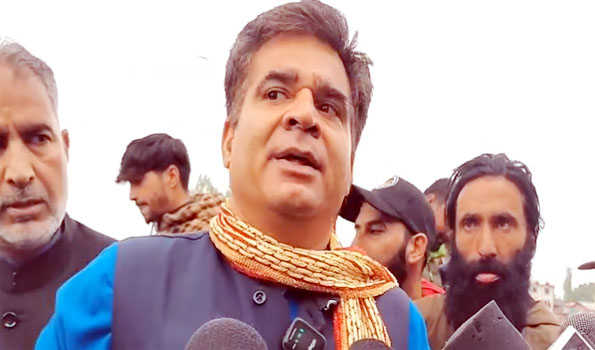For the frequent closure of Srinagar-Jammu National Highway, many blame the ‘faulty’ excavation work being carried on along its Banihal-Ramban stretch.
“The excavation work being undertaken by the National Highway Authority of India (NHAI),” an official said, “triggers frequent landslides due to which road remains blocked quite often”.
He said as the Banihal-Ramban stretch is already a landslide and shooting stone prone area, the standard engineering techniques are not being considered at all.
“The executing agency has ignored the safety part and it lacks any plan to tackle the weather vagaries,” an official said.
The NHAI, executing the widening project of highway 44 was supposed to complete work on 36 Km Banihal–Ramban by 2019 only.
However, the concessionaries entrusted with the job, HCC, missed several deadlines due to its “lethargic approach” as well as “financial constraints”, officials said.
An official said as part of the contract, the executing the agency was also supposed to keep the already existing Highway in proper working condition; however, it has failed to take proper care of the road.
The landslides have left the stretch further narrow due to which the highway, considered to be the lifeline of the valley, either remains mostly closed or operates only for one way traffic.
The closure of the Highway leads to a short supply of stocks to Kashmir and a steep hike in the prices of essential commodities.
The stretch is also dotted with potholes and ditches making the journey along the Highway arduous and resulting in frequent traffic jams. The road also becomes vulnerable to accidents. The shooting stones have already consumed many precious lives in road accidents this winter.
In December, a Deputy Inspector General, CRPF and his driver were killed as their vehicle plunged into a deep gorge after coming undershooting stones between Panthal and Digdole.
On March 7, a Srinagar youth was killed after a shooting stone hit his Creta vehicle near Marog Ramban.
Days before that incident an Anantnag Tavera driver was killed and his passenger went missing after the vehicle they were on board fell into a gorge due to the landslides near Cafetrai Morh Ramban.
Two Bolero vehicle bound passengers also lost their lives this winter near T-2 tunnel Marog Ramban due to the landslides.
“The condition of the road is so bad that it is virtually impossible for the vehicles to ply,” said a sumo driver Mushtaq Ahmad.
He said even a light snowfall or rain leads to the closure of the road and the passengers get stuck en-route for days together.
“This winter we witnessed many ambulances carrying the dead bodies to the valley, remained stranded on the highway for several days,” said Muhamad Abrar of Ramban.
Even the airfares go sky high during the time when the Highway remains closed.
An official said, even as we are now stepping into April, the highway remains blocked at several places along the stretch due to the excavation work. These places are; Hengni, Gangroo, Sherbibi. Kharpora, all between Banihal to Ramsoo and Marog,, Panthal, Digdol, Monkey Morh, Battery stream besides several other spots in the Ramban area.
This time, an official said, the two hundred-meter stretch of the road has caved in near Dalwas blocking the highway completely as the authorities struggle to clear it.
“The non-availability of manpower and machinery is hindering the work,” he said..
Project Director, NHAI Ramban Purshotam Kumar, however, said the damage to the 1.5 Km slope from Dalwas to Nashri has nothing to do with excavation work.
Kumar, however, said due to the earthwork, the drainage has been rendered defunct as a result of which the road is damaged in some places.
“The road is narrow at only certain points due to landslides,” he said.
Meanwhile, The 270-km-long Srinagar-Jammu National Highway remained closed for the fifth successive day on Tuesday.
Senior Traffic Police officials said more than 1100 trucks carrying essential commodities to the Valley and those returning remained stranded on the arterial road due to multiple landslides. “As a result of multiple landslides and threat of further landslides, the highway remained closed for the fifth day today. Men and machinery are on the job to make the road travel-worthy,” an official said.
As per a traffic advisory issued on Tuesday, the highway will continue to remain closed for traffic on Wednesday for any sort of traffic in view of the prediction for rain and snowfall in higher reaches.
An official said the National Highway Authority of India (NHAI) is working to clear the highway and make it motorable but rainfall and movement of rocks from adjacent hills have made the task difficult, the official added.
“It would take some more time to clear the portion of the highway near the Battery Chasma area in Ramban district,” the official said.
It may be mentioned that the highway has remained closed for more than 45 days since November 2019 due to inclement weather.
Frequent closure of the highway has caused a shortage of supplies in the Valley which is already reeling under the problems due to the prevailing situation owing to Covid-19.
The Mughal Road connecting Shopian district to Pir Panchal and the Srinagar-Leh National Highway also remain closed for traffic due to accumulation of snow, the travel advisory said.
Two Day Wet Spell
Meanwhile, the Meteorological Department has predicted a 2-day wet spell in Jammu & Kashmir and Ladakh beginning Tuesday night.
Director MeT Sonam Lotus said a fresh spell of intermittent light to moderate rain in plains and snowfall over higher reaches of J&K and Zojila, Drass and some areas of Zanskar region of Ladakh is most likely to occur during March 31 night to April 2 forenoon.
“As usual it may lead to landslides in Banihal-Ramban axis of Jammu-Srinagar National Highway,” Lotus said.
He said thunderstorm with strong gusty winds of the order of 30-40 kilometers per hour is also likely during the two-day wet spell. “In view of this, farmers are informed to postpone spraying of their orchards, prepare drainage to drain excess water from their fields,” Lotus said.






